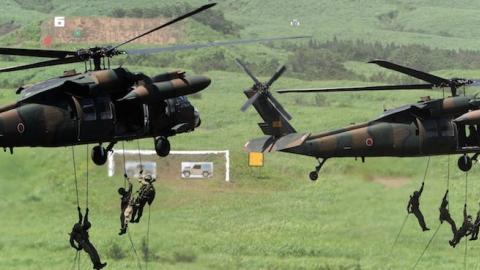In a controversial move, the Abe government earlier this year relaxed some of the strict export controls on Japan's defense contractors. This could presage an era of big profits for Japanese companies like Mitsubishi, Toshiba, and Shinmaya, the aircraft manufacturer. Or, it could lead to big problems if not done right.
Japanese companies have been forbidden from selling arms abroad for nearly half a century, when a pacifist-minded parliament restricted exports of military equipment from Japan in 1967. That restriction became a virtual blanket ban in 1976, even though Mitsubishi, Mitsui, and Kawasaki were making helicopters, tanks, ships, as well as aircraft and aircraft engines for Japan's own steadily growing Self-Defense Forces.
Although Japanese military equipment has a reputation for being well-made, reliably high-tech, and reasonably priced compared to, say, the American competition, Japanese executives have had to watch idly as the United States, Russia, France, and even South Korea and China captured foreign markets.
All that's now slated to change. Prime Minister Shinzo Abe has pledged to bring Japan's defense posture up to a more active and realistic level for the world's third-largest economy. In a first step toward allowing Japanese defense contractors to sell abroad, Mitsubishi Heavy Industries will produce infrared sensors for American missile-maker Raytheon which will then be sold to Qatar. Other deals in the making include developing advanced submarine technology with Australia, and selling fifteen US-2 seaplanes to India.
It's a market that Japanese companies, with their marketing skills and sophisticated product development, seem destined to dominate. There's a great deal more—from tanks and artillery to helicopters and missiles—that Japan can sell. Global arms sales are slated to rise dramatically in the next decade, especially in Asia. A secret memo that circulated among Japanese defense executives in 1988 predicted that if Japan was allowed to sell defense articles abroad, it could capture 45% of the world tank market, 40% of military electronic sales, and 60% of naval ship construction.
But before the celebrations start, it's important to realize Japan's defense industry also faces severe obstacles, some of which are Japan's own making. The first is that they are late comers to the game, compared to the United States, Russia or even South Korea.
The rules of the international defense market, where every country has its own esoteric import-export restrictions and licensing requirements, are staggeringly complex. Much depends on relationships of trust developed over years and a proven track record. Foreign customers may like the sophisticated features of Japan's Type 90 battle tank or its OH-1 observation helicopter. But they also like a tank or helicopter that's been tested on the battlefield.
Another obstacle is that defense is a small share of the overall business even for Japan's biggest defense contractors: 4 percent of sales on average, according to Japan's Ministry of Defense. Selling military systems abroad may not draw the kind of managerial attention and focus they'll need to penetrate that market, at least at first. And company executives won't like burgeoning defense sales that brand them as "merchants of death" in a country that's still largely pacifist.
So what's the solution? One might be to slip stream behind the most experienced player in foreign military sales and the biggest defense market in the world—the United States. Forming a series of joint ventures with U.S. defense contractors like the Raytheon-Qatar deal will help develop knowledge of how to sell not only in the United States, but also in Europe and the Middle East.
Creating a North American subsidiary and acquiring small- to medium-sized U.S. firms that already have a toehold in both the U.S. and the global defense market could also help. The British firm BAE Systems has done that with enormous success and is now one of the biggest defense contractors in the US. The Italians are doing the same thing with Finmeccanica.
Japan's Fujitsu took a small step in that direction this year by acquiring the Texas firm GlobeRanger, which makes radio frequency identification systems. Like so much of the modern defense industry, it's a product that relies on the high-end electronic components Japan excels at making and could be selling to other American defense contractors.
Although Japan is a late arrival to the global defense market, it could succeed by building a closer bilateral defense trade relationship with its ally, the U.S. By relying on U.S. knowledge of the foreign defense trade market and emphasizing their own strength in the high-end electronics so essential to today's military systems, Japanese firms could yet see a bright new future in defense-related business.



















